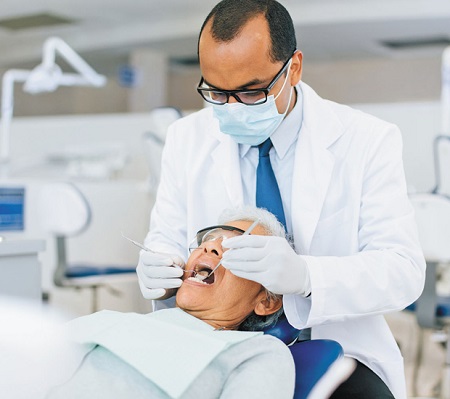Oral Medicine / Pain & TMJ Management
Any form of oral pain such as toothache, jaw pain and burning sensation of the oral cavity can be a major source of distraction in one’s daily routine. If left untreated, these conditions can develop into more serious oral health problems. Our services in Oral Medicine are particularly useful to those suffering from symptoms such as orofacial pain, clicking sounds in the ear, restrictive or painful jaw movements, and oral ulcers. Our experts also perform early detection of cancerous and pre-cancerous conditions such as red and white lesions, and non-healing ulcers of the oral cavity. Based on physical examinations, doctors may recommend biopsy to deal with timely dismissal of lesions pertaining to oral cancer. Apart from dealing with ulcers, when it comes to oral-facial pain, we also provide highly effective solutions including oral splints and mouth guards to effectively address cases of Pain and TMJ Management.
Some common treatments for oral medicine, pain management, and TMJ management may include:
- Oral Pathological Lesions: Oral pathological lesions are abnormal changes or growths that occur within the oral cavity or on the lips, tongue, or other surrounding areas. These lesions can be caused by a variety of factors, including infections, inflammation, trauma, autoimmune disorders, and cancer.
- Oral Cancer: Oral cancer is a serious condition that can affect the lips, tongue, cheeks, gums, and other areas of the oral cavity. It is typically caused by abnormal cell growth, which can develop into a malignant tumor if left untreated.
Regular oral cancer and precancer screenings are important, particularly for individuals who have a history of tobacco use, heavy alcohol consumption, or other risk factors for oral cancer. Some common risk factors for oral cancer include:
- Tobacco use (smoking or chewing)
- Heavy alcohol consumption
- Family history of cancer
- Human papillomavirus (HPV) infection
- Poor oral hygiene
- Chronic irritation or trauma to the oral cavity
- Bad breath, or Halitosis: Bad breath, or halitosis, is a common condition that can be caused by a variety of factors, including poor oral hygiene, certain foods, smoking, and underlying health conditions. Here are some tips for managing bad breath:
- Practice good oral hygiene: Brush your teeth twice a day, floss daily, and use a tongue scraper to remove bacteria from your tongue.
- Stay hydrated: Drink plenty of water throughout the day to help keep your mouth moist and prevent dry mouth, which can contribute to bad breath.
- Watch what you eat: Certain foods and drinks, such as garlic, onions, and coffee, can cause bad breath. Try to avoid these foods or limit your intake.
- Quit smoking: Smoking can cause bad breath and also increase the risk of gum disease and other oral health problems.
- Use mouthwash: Mouthwash can help freshen your breath and kill bacteria in your mouth.
- Chew sugar-free gum: Chewing gum can help stimulate saliva production and freshen your breath.
Treat underlying health conditions: If your bad breath is caused by an underlying health condition, such as gum disease or acid reflux, it is important to address and treat the underlying condition.

